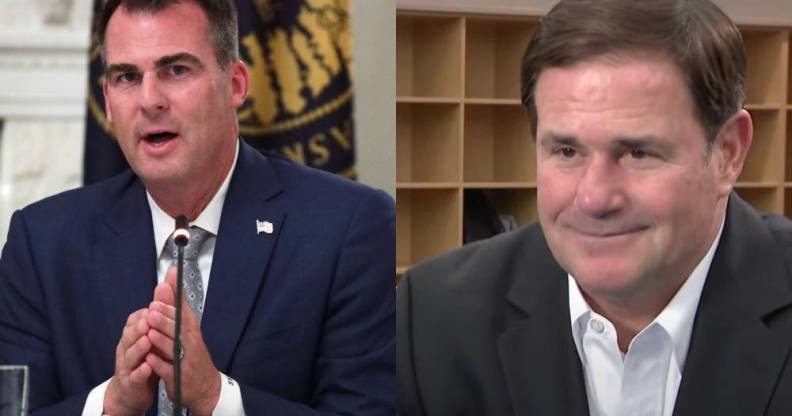‘Cowardly’ Republican governors sign anti-trans bills into law on eve of Trans Day of Visibility

Oklahoma governor Kevin Stitt and Arizona governor Doug Ducey. (Getty/Alex Wong/YouTube/12 News)
Republican governors in Arizona and Oklahoma have signed a slate of anti-trans bills into law.
On Wednesday (30 March), Oklahoma governor Kevin Stitt signed a law banning trans women and girls from competing on sports teams that align with their gender identity. The ban covers publicly-funded K-12 schools and higher education institutions in the state.
Just hours later, Arizona governor Doug Ducey also signed an anti-trans sports ban into law. At the same time, Ducey also signed legislation attacking gender-affirming healthcare for trans youth in the state.
Stitt has claimed that the measure, known as Senate Bill 2 (SB 2), is “just common sense” to “us in Oklahoma”.
However, many Oklahomans disagree.
Tamya Cox-Touré, executive director of the ACLU of Oklahoma, said Stitt sent a “clear message” to the state’s “vulnerable” trans youth that they “are not welcome or accepted in our state” by signing the bill.
“SB 2 is just one of many bills we have seen attacking our Two Spirit, transgender and nonbinary communities this session, while overlooking the real issues with gender equality in sports when it comes to funding, resources, pay equity and more,” Cox-Touré said.
“Promoting baseless fears about trans athletes does nothing to address those real problems.”
Cox-Touré said that the legislation “violates” the US Constitution and federal civil rights law, “put Oklahoma at risk of losing federal funding” and hurts trans youth just to “solve a problem that does not exist”.
Like Oklahoma’s bill, Arizona’s Senate Bill 1165 (SB 1165) bans trans girls and women from playing sports aligning with their gender identity in public K-12 schools and higher education institutions in the state as well as any private schools that compete against them.
Another Arizona bill now signed into law, Senate Bill 1138 (SB 1138), prohibits healthcare officials from providing “irreversible” gender-affirming surgeries to any individual who is under the age of 18. The bill does make some exceptions, including for intersex people.
Ducey argued in a statement after he signed the bills that the legislation is “common sense” and “narrowly targeted” to address “specific issues” while “ensuring that transgender individuals continue to receive the same dignity, respect and kindness as every individual in our society”.
But Cathryn Oakley, state legislative director and senior counsel for the HRC, accused Ducey of choosing “discrimination over protecting the well-being of vulnerable children” in Arizona.
“This isn’t leadership, it’s cowardice,” Oakley said.
She added that Arizona lawmakers pushing the legislation are “directly responsible for the harm they cause” trans youth by “subjecting them to continual intrusive attacks on their dignity and humanity”.
Sam Ames, director of advocacy and government affairs, lamented that the anti-trans bills in Arizona and Oklahoma were signed into law “on the eve of Transgender Day of Visibility”.
“This onslaught is not an accident; it is overwhelming by design and in direct response to progress in the fight for trans rights,” Ames said.
With Arizona and Oklahoma signing anti-trans sports bans into law, there are now fourteen states in the US that restrict how trans students can participate in school sports.
In 2022, five states have enacted such legislation with bans in Iowa, Utah, Arizona and Oklahoma being passed into law in March alone.
Earlier this month, Indiana governor Eric Holcomb vetoed a bill that would have banned trans students from competing in girls’ and women’s sports at school.
In a letter explaining his veto, Holcomb found “no evidence” that the bill would fix an existing issue in the state and said the legislation’s current wording “falls short” of providing a consistent statewide policy for what he designed as “fairness in K-12 sports”.
As such, he thought the bill would leave schools at risk of potential lawsuits in the future.
However, lawmakers in Indiana could potentially override Holcom’s veto when they next meet in May.

